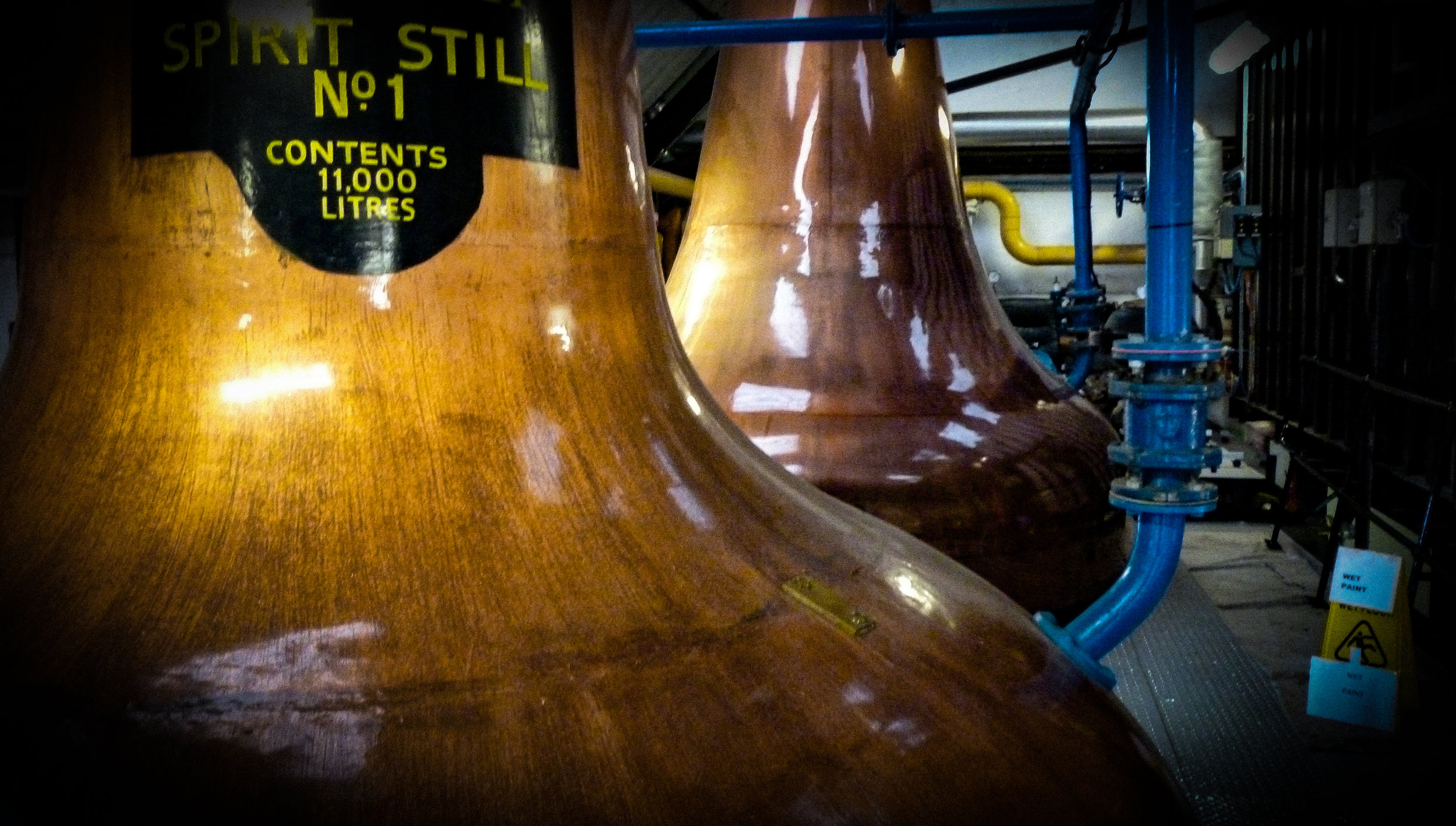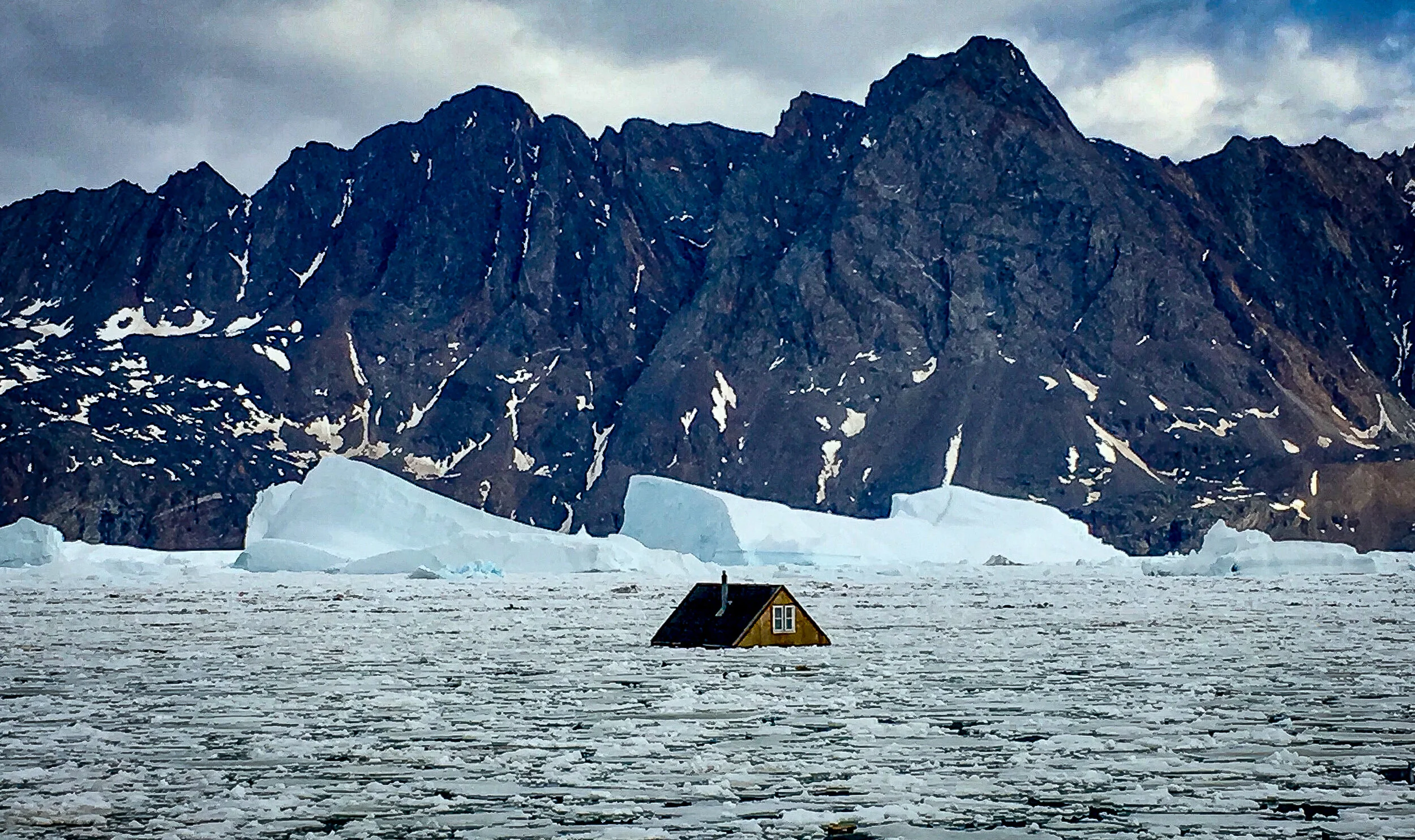Whisky, Motorcycles, Ireland And Scotland
CULTURE
Writer: Tom Morton
Photographs: Tom Morton
October 2017
Forty years of motorcycling, and I’ve never fallen off once.
Now here I am, in the deceptively sloping car park of Bushmills Distillery in Northern Ireland, lying underneath a Triumph Street Triple R, 675cc of expensive motorcycle which has just toppled with a sickening crunch onto my legs and torso.
There’s no pain, not yet. There was horror, a sense of awful inevitability as, swinging my leg over the heavily-laden bike to get off, I caught my foot on the saddle, fell heavily to the ground and watched the Grey Beast teeter on its dodgy kickstand and then descend towards my aged body...
Worse, there were witnesses. As I lay on the ground waiting for the impending agony and damage to both myself and the motorbike (brand new, borrowed, amid much dubiety about its insurance status, from the Triumph factory press fleet) I could see the horrified face of Gordon Donoghue, manager of Bushmills and keen motorcyclist himself. It was manoeuvring my bike close to his immaculate Triumph Bonneville that provoked my awkward and ultimately failed attempt to dismount. In fact, it was all Gordon’s fault.
And I could see in his eyes he thought so too. Or rather, that it was all the fault of Bushmills Whiskey, its manager, Pernod Ricard, owners, and possibly the Protestant God who inhabits this part of Northern Ireland, makes the populace paint the paving stones red, white and blue, spreads Him (or Her) self among the dozens of competing churches of a Sabbath morning, and turns a blind Presbyterian eye to the fact that Jameson’s, that good Catholic whiskey made at Cork in the Republic of Ireland, is actually bottled in Bushmills. Mostly by Protestants.
In the milliseconds the whole incident took, I could see Gordon’s brain turning over various considerations: The array of Bushmills new make spirit and finished whiskeys I had inhaled, if not drunk, that morning: had I addled my motorcycling body and brain, despite a rigid adherence to the sniff-spit-don’t-swallow rule? Would there have to be a full Health and Safety inquiry into the incident? Would I sue for compensation due to bad car park camber? Meanwhile, I could hear the sound of laughter, somewhere. That would be Rob Allanson, my companion on this motorcycle adventure, editor of Whisky Magazine, rider of an identical Triumph and unsympathetic critic of my clumsiness, age and hapless incompetence as a motorcyclist. Not to mention my inability to wax lyrical about (1) the bass playing of Stanley Clarke (jazz noodling, in my opinion) or (2) the cinnamon overtones to be detected in the nose of a 1994 Glen Rothes single malt whisky (I’d go for warehouses, ash, sherry, dirty socks and ginger with the merest hint of baby sick and quarry dust).
What has brought me to this? Well, a motorcycle, obviously.
Whisky, though, is the overriding reason for this trip. We’re collecting bottles from distilleries in Ireland, Scotland and, yes, England and Wales for charitable purposes. We’re stopping overnight at most of the booze factories to sip some of the stuff too. But you guessed that.
Why whisky? Why not... I don’t know, sail around rum distilleries in the Caribbean? Sledge around Siberia looking for Vodka? Skateboard from primary school to youth club, celebrating the alcopop, bigging up the Bacardi Breezer?
Well, the thing is, I have got form with whisky. The two of us go back a long, long way. It’s a Scottish thing, and Scotland and myself have a shared history too. Mostly. Like many Scots, I am a bit of a mongrel. Scots-born parents, but I was born in Carlisle, England. Mum’s mother was from Northern Ireland, Dad’s father was born in Africa. It’s complicated.
I happen to think that whisky is very... nice. Very interesting. And much more. I have spent a great deal of time sniffing it, tasting it, talking about, listening to music which mentions it. While drinking. and I know it is seen very much as synonymous with Scotland, as crucial to the country’s culture and identity, but for me, it’s also about music. Rock’n’roll music. Whisky and rock’n’roll go together like... motorcycles and injury. Think of Keith Richards on stage with the Stones, in the old, pre-headband days, a bottle of Jack Daniels or Jim Beam atop his amp. The Faces with their infamous on-stage bar. Tom Waits before he sobered up, married and turned into a Bertolt Brecht tribute act. Lynyrd Skynyrd. Thin Lizzy.
I know quite a lot of about whisky. I have strong opinions about the nonsense some so-called connoisseurs spout when faced with a dram and an audience. Indeed, I have myself uttered such unutterable rubbish, during whisky tasting events I have hosted from Johannesburg to Wigtown.
There are worse places to die. Distilleries are, after all, locations of glory and delight, magical repositories of wondrous, alchemical arts, centres for the transformation of base agricultural substances into golden spirit. I’ve visited stills and their accompanying mills, maltings, mash tuns and other ancillaries. Slurped from illicitly opened barrels in dank, cavernous warehouses. I’ve been from Wigtown to Wick, from Bruichladdich to...Bushmills. Where it now looks as if I may have to stay for a while. Resting here in my back, a rather nice Triumph on top of me, like some kind of mechanical comfort blanket in steel and plastic.
A song pops into my head.
Lynyrd Skynyrd, it could be argued, only had about three real tunes (Freebird, Sweet Home Alabama and The Endlessly Extended Chug-a-Lug Blues Jam). Whiskey.
Rock’n’Roller tended to become The Endlessly Extended Chug-a-Lug Blues Jam live on stage, but its lyrics have that genuine sense of breast-beating look-ma-ah’m-drinkin’ rock excess that has, in a moderate, restrained sort of way, informed my life. Motorcycles, whisky and music: central to the Skynyrd myth (and cars, and aeroplanes, sadly, like the one that nearly wiped the band out) and to my own. You could add some religion to the mix, if you like. Skynyrd certainly would have been uneasily aware of that Robert Johnson rock’n’roll deal with the devil they’d made, and the fact that God was just longing to take a little vengeance. Me, I’ve been waiting for the lightning bolt to fall from an annoyed divinity ever since I gave up my faith and life as a travelling evangelist to follow alcohol and music and moderate excess. Journalism was the obvious place to pursue these interests.
There was a time when journalism was a reasonably exciting occupation. And you got paid real money for doing it, too.
Anyway, there are a couple of lines from Whiskey Rock’n’Roller that capture it all: religion, in the form of a prayer:
‘Lord, don’t you take my whiskey and rock’n’roll,’ and the rest. Sex, alcohol, movement across the planet: ‘Women, whiskey and miles of travelin’ is all I understand.’ Quite. Couldn’t have put it better myself. Didn’t. Though I might have spelt whisky without the ‘e’. This whisky/whiskey spelling conundrum: It’s basically down to Scotch having once been absolutely terrible. Poor quality, frequently toxic. Bear with me.
The name comes from Gaelic (pronounced Gaylic, if we’re talking in Irish, or Gaelic (prounounced Gallic, if we happen to be in Scotland). Scots Gaelic developed from the Irish version, and it’s more than probable that the magical recipe for whisky came from there too, courtesy of Columba or his various monkish followers. Uisge beatha, in Scots Gaelic, Uisce beatha in Irish. Water of Life. And if you’re thinking that seems awfully similar to the Latin aqua vitae, as in Aquavit, or Eau de Vie, as in Cognac, Armagnac or Calvados, then you’re absolutely right. Those Latin-speakers have been using the term since the 1300s. But in every culture, in every country, distilled alcohol has been seen as a life-affirming, life-giving liquid. Magical. An elixir, in fact. Of course, in large quantities, it will kill you, but its origin was as a medicine. And to go back to Gaelic (Scots) that’s why it’s best to moderate your intake by asking for te bheag. A wee one. You can have several wee ones. Lots of wee ones. Enough wee ones to sink the proverbial Titanic. But stick to wee ones and you’ll be all right, mostly.
Alcohol, then. Did the Irish monks invent it? Some would say it’s impossible to believe that alcohol could first have been distilled anywhere else. But no, the Celts did not pioneer the hard stuff. Forget the monks. Forget (for the moment, as we shall return to it) Christianity. Alcohol is an Islamic invention. Sort of.
We’re talking ‘pure’ distillation here, as there’s been a form of it on the Indian subcontinent since 500BC. Ethanol - C2H5OH – boils at 78.4 degrees centigrade, which is lower than water. That means it comes wafting off heated, fermented liquid before watery steam does. All you have to do is condense it on something cool, and bingo: Bob is your wobbly-legged uncle.
Forget all that mystical Celtic twilight nonsense about some pre-croft heathery crofter accidentally boiling up beer and licking shockingly strong ethanol off the top of his curiously-shaped iron pot. It was all happening way to the east. Arab and Persian chemists, at the absolute cutting edge of science in their day, took the technology forward, developing processes and equipment that would be recognised and admired today within the precincts of the Heriot Watt University Brewing and Distilling of Mind-Altering Liquids Department.
Even the word ‘alcohol’ itself comes from the Middle East.
The term appears in English in the 16th century, entering the language via French from medical Latin, ultimately from the Arabic al-kuhl, Kuhl (kohl) is a powder used as an antiseptic and eyeliner then and now, and ‘al’ is the Arabic for ‘the’. So alcohol takes its name from eye shadow, though not because it caused a natural equivalent to occur in those who’ve been up all night sampling the stuff. One explanation is that ‘Kohl’ was seen as the essence of the plant it was extracted from, Indian Devilwood, and became a generic term for the essential spirit of something. Better than ‘Max Factor’, anyway. Alternatively the word ‘kuhl’ may come from ‘kahala’, which means to colour or stain.
By the mid-18th Century, alcohol was solidly defined in English as the ‘intoxicating ingredient in strong liquor’. What about those Celts, though? Ireland first. In 1405, in the Irish Annals of Clonmacnoise, (a lost Irish chronicle translated in the early 17th century) the death of chieftain is recorded. He perished at Christmas, after “taking a surfeit of aqua vitae”. As for Scotland, we have to leap forward 89 years, to 1494, for the famous in entry in the Exchequer Rolls where the malt was sent “to Friar John Cor, by order of the king, to make aquavitae”.
How did the Gaelic ‘uisge beatha’ turn into ‘whisky (no ‘e’)’? Soldiers, probably, invading Ireland, beating up monks, pronouncing very badly the name for their medical liquid (because before it was quaffed recreationally, it would have been the magical preserve of mysterious healers). You can just imagine these rough chaps, grabbing a bottle marked ‘do not take internally’, and knocking it back. What’s this called? Ooshkiva! Whit?
Ooooshhhkivaaah....Oosh...
ooshhka...
oooshki...
Whisky.
The thing is, whisky is more than indulgence, more than drunkenness. It is both magic and science, conviviality and solitary insight. And to those who say, it’s all the same...well, yes. You’re right. And you’re wrong. The difference between a childishly disgusting George T Stagg 2009 small batch Kentucky straight bourbon, bottled by at 70.7 per cent alcohol (a Friday night Humvee, steering erratically along a single track road), and a stunningly sophisticated Glen Rothes 1994 (a smooth-but-heartbeat thumping Moto Guzzi Bellagio on a deserted A96, the smell of sherry butts and pine trees wafting down on you as you power along towards Speyside nirvana) should be obvious to any consumer. One tastes of burnt forests, the other doesn’t. One is a bad car, the other a motorcycle (Note: an Italian one; they don’t traditionally make whisky in Italy but they really, really like it).
On the other hand, there is the Truth According to Hamish Henderson. Henderson was (he died in 2002) an intellectual, lecturer, folk song collector, hero of the German resistance to Hitler, pacifist, soldier (he personally accepted the surrender of Italy from Marshall Graziani) and poet, seen by many as Scotland’s greatest since Robert Burns. He was, in many senses, Scotland. Once, a friend of his who was involved in the whisky industry decided it would be a good idea to obtain the great man’s verdict on a few rare single malts, for possible marketing purposes. After all, wouldn’t the great poet capture the grandeur and greatness of these fine spirits with words of deathless beauty, aesthetic insight and intellectual rigour?
The tasting began with due ceremony. The correct glasses, the small jug of water, the holy libations themselves. Henderson sniffed and sipped, a beatific expression on his face. Time passed. At length the poet was asked to describe the experience of drinking this excessively expensive, hugely aged dram. What, he was asked, was it like. There was along pause. And then Henderson smiled, shook his head, and held out his glass for a refill. “I’ll tell you what it was like,” he said. “It was like...whisky.”
Here comes Gordon and Rob. They’re gingerly lifting the bike off me. Does it hurt, they’re asking? Are you all right? Not yet, I’m thinking. And all right? Well, is there any of that Bushmills 10-year-old new-make spirit handy? I think a wee sip might help...or we could rub it on my mild abrasions as disinfectant. And send for some proper whisky. From Scotland.
*** *** ***
As it turned out, I was not seriously damaged, although the bike was: Over £2000 to repair, Triumph insisted.
It was a severe lesson to me. I have never touched Irish
whiskey since. ▢
For travelers to Scotland and lovers of the liquid, there are over a hundred opportunities of visiting traditional whiskey distilleries.
Glengarioch (pronounced Glen-geery) is the closest whisky distillery to Aberdeen in north-east Scotland,if you don’t count the various semi-experimental stills being operated by the giant Brewdog beer business at Ellon. Founded in 1797, it is one of the oldest Scottish distilleries still in operation.
It is a curious distillery in that it takes up various ‘blocks’ in the farming town of Oldmeldrum , with overhead pipes connecting different parts of the plant. Local residents drive up and down the various streets in which the distillery is sited, and the ancient buildings seem very cramped when you go inside.
Visitors are welcome. Pictures show the distillery exterior, the mash tuns, where the mixture of malted barley, yeast and water is fermented, and the still room, where the wort - the fermented, beery liquor - is distilled in copper pot stills.
Tasting sessions at Glengarioch often combine the various bottlings with local cheeses, and the combination of food and spirit is for many a revelation.
Full details of how to visit Glengarioch can be found at www.glengarioch.com
Thomas "Tom" Morton is a well known Scottish writer, broadcaster, journalist and musician. Author of several books e.g. the biography of Gaelic rock band Runrig, a whisky travelogue The Spirit of Adventure and several novels published on both sides of the North Atlantic. He has written as a journalist, staff reporter and columnist for several print publications such as the Daily and Sunday Express, The Shetland Times and The Scotsman and had his music show on BBC Radio Scotland for years. Tom Morton is a member of the JONAA editorial team. He lives and works mainly in the Shetland Islands.
























